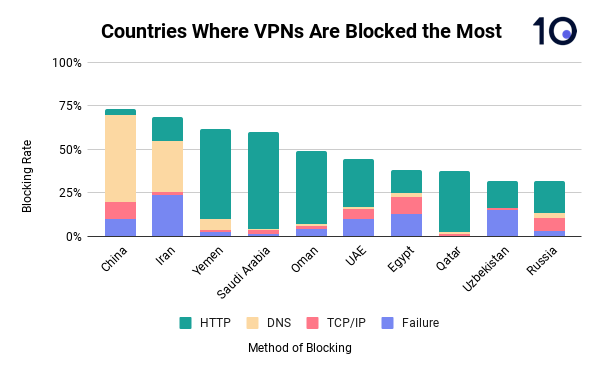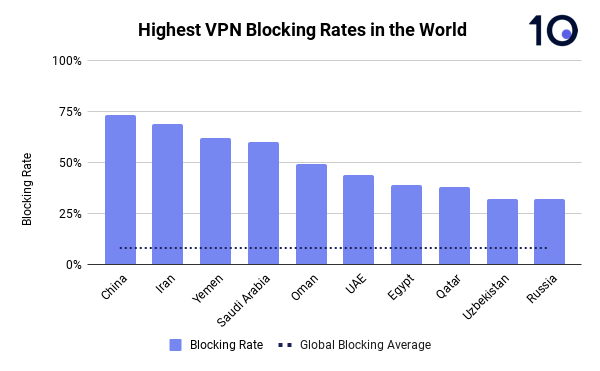The global adoption of VPN services has witnessed a remarkable surge in recent years, particularly during political instability. Individuals residing in countries like Russia, Iran, and Senegal have found solace in utilizing VPNs to safeguard their privacy and overcome website restrictions imposed by authorities. However, governments worldwide are attempting to restrict the use of these powerful tools, which encrypt internet connections and provide anonymity by spoofing users' IP addresses.
To understand the extent of VPN censorship globally, researchers at Top10VPN conducted an investigation. Around millions of internet measurements were analyzed from over 100 countries collected between January 1 and May 15, 2023, that focused on the general method governments use to disrupt VPN services: blocking providers' official sites.
As a result, the two most notorious countries for blocking VPNs were China and Iran. Not only this, the study revealed that China blocked VPN websites over eight times more frequently than the global average of 8%. The United States, Hong Kong, and the United Kingdom also censor around 4% of VPN connection attempts.
The highest VPN censorship rates list contains these top 10 countries: Yemen, Oman, Saudi Arabia, the United Arab Emirates, Qatar, Egypt, Uzbekistan, and Russia. Remember that China and Iran lead the pack, blocking 73% and 69% of VPN attempts, respectively, compared to the global average of 8%.
The digital rights researcher at Top10VPN, Samuel Woodhams, was also surprised at the high level of VPN website blocking in Russia, bearing in mind the recent rise of anti-VPN sentiment. While Russia still lags behind China and Iran despite restricting access to VPNs.
The analysis also revealed the strategies employed by governments to avert access to VPN sites. China and Iran chiefly rely on DNS altering, while IP-based blocking and HTTP/HTTPS interference are standard. What makes it saucier is that the most frequently blocked service across all ten countries is The Tor browser, likely due to its popularity and high security.
Woodhams highlighted the prominence of documenting VPN website blocking to monitor censorship efforts by countries like Russia. He acknowledged that despite the strict restrictions, some individuals can access these tools even in the most oppressive nations. Lesser-known avoidance tools such as Ceno, OpenPGP, and Lokinet have remained accessible.
On a lighter note, to avoid or tackle censorship tactics, users can also download VPN services from app stores. However, it is safer and better to avoid downloading malicious versions through third parties. Individuals living in strongly governed countries should download various VPN programs and switch between them in case of bans.
In conclusion, blocking VPN websites and other privacy-protecting technology demonstrates the different methods by which governments seek to control online narratives. The countries with the most severe internet restrictions are cracking down the hardest on VPNs, negatively impacting residents' digital rights, privacy, free expression, and access to information. Despite these challenges, alternative tools and workarounds allow users to reclaim their digital rights and reconnect to a more complimentary internet.
Read next: 19% of Web Traffic is Malicious, and 95% of Malicious Traffic Comes from Botnets According to New Study
To understand the extent of VPN censorship globally, researchers at Top10VPN conducted an investigation. Around millions of internet measurements were analyzed from over 100 countries collected between January 1 and May 15, 2023, that focused on the general method governments use to disrupt VPN services: blocking providers' official sites.
As a result, the two most notorious countries for blocking VPNs were China and Iran. Not only this, the study revealed that China blocked VPN websites over eight times more frequently than the global average of 8%. The United States, Hong Kong, and the United Kingdom also censor around 4% of VPN connection attempts.
The highest VPN censorship rates list contains these top 10 countries: Yemen, Oman, Saudi Arabia, the United Arab Emirates, Qatar, Egypt, Uzbekistan, and Russia. Remember that China and Iran lead the pack, blocking 73% and 69% of VPN attempts, respectively, compared to the global average of 8%.
The digital rights researcher at Top10VPN, Samuel Woodhams, was also surprised at the high level of VPN website blocking in Russia, bearing in mind the recent rise of anti-VPN sentiment. While Russia still lags behind China and Iran despite restricting access to VPNs.
The analysis also revealed the strategies employed by governments to avert access to VPN sites. China and Iran chiefly rely on DNS altering, while IP-based blocking and HTTP/HTTPS interference are standard. What makes it saucier is that the most frequently blocked service across all ten countries is The Tor browser, likely due to its popularity and high security.
Woodhams highlighted the prominence of documenting VPN website blocking to monitor censorship efforts by countries like Russia. He acknowledged that despite the strict restrictions, some individuals can access these tools even in the most oppressive nations. Lesser-known avoidance tools such as Ceno, OpenPGP, and Lokinet have remained accessible.
On a lighter note, to avoid or tackle censorship tactics, users can also download VPN services from app stores. However, it is safer and better to avoid downloading malicious versions through third parties. Individuals living in strongly governed countries should download various VPN programs and switch between them in case of bans.
In conclusion, blocking VPN websites and other privacy-protecting technology demonstrates the different methods by which governments seek to control online narratives. The countries with the most severe internet restrictions are cracking down the hardest on VPNs, negatively impacting residents' digital rights, privacy, free expression, and access to information. Despite these challenges, alternative tools and workarounds allow users to reclaim their digital rights and reconnect to a more complimentary internet.
Read next: 19% of Web Traffic is Malicious, and 95% of Malicious Traffic Comes from Botnets According to New Study


